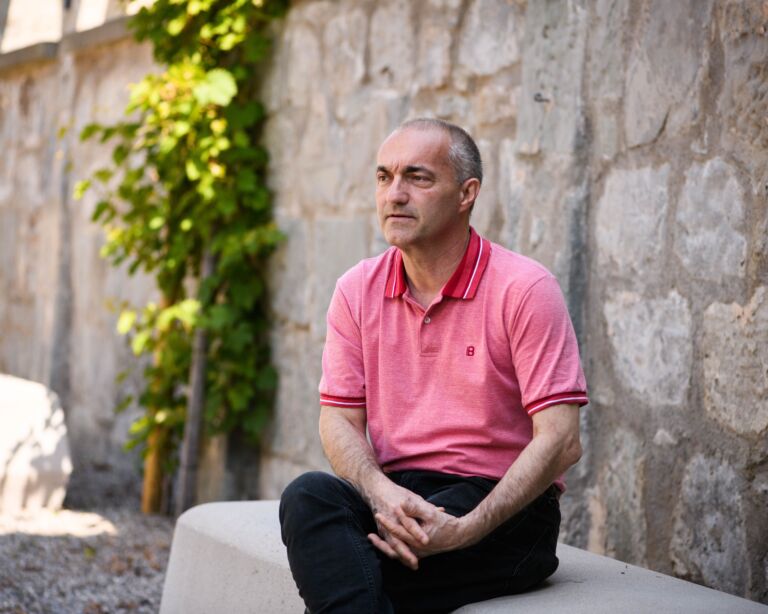On closer inspection, a cause can often be identified and treated, and in many cases the dizziness disappears of its own accord. Dizziness in itself is a symptom, it is about finding the trigger. This can be on a physical or psychological level. Each dizziness must therefore be considered and treated individually.
Dizziness
Vertigo
Almost everyone has experienced the feeling of vertigo in some situation or other. About every 13th patient complains to their GP about feelings of insecurity such as spinning, swaying, falling or dizziness. In most cases, vertigo is not the result of a serious illness.

Overview: What is dizziness
Dizziness is a deeply unsettling feeling; for those affected, everything wobbles when lying or standing. They think they might fall or not be able to stand securely on their feet. They either have the sensation that they themselves are spinning and swaying or that the environment around them is spinning. Medically, a distinction is made between the
- vestibular and
- non-vestibular psychogenic vertigo.
All types of vertigo associated with the vestibular system are referred to as vestibular vertigo. Our sensory systems, joints, muscles and brain need to work together smoothly so that we can move around safely. Our body is able to maintain balance thanks to different types of information that it collects from different places and processes in the balance center, which is located in the brain stem. provide impulses:
- vision – optical system,
- the organ of balance in the inner ear and
- the sense of touch and depth of the limbs.
A whole series of malfunctions can occur in the transmission chains. Visual disturbances or new glasses, for example, provide contradictory information to the vestibular center, which can then cause vestibular vertigo symptoms. Deposits in the semicircular canals of the inner ear cause irritation and report sensory perceptions that do not match the information provided simultaneously by the eyes.
If physical disorders or illnesses are the cause of dizziness, they fall under the generic term non-vestibular types of dizziness. When taking a medical history of dizziness complaints, it is essential to rule out all physical causes. Non-vestibular forms of vertigo can be caused by various physical illnesses, changes in the cardiovascular system, diabetes or nervous disorders.
If the vertigo symptoms are due to psychological causes, they are referred to as psychogenic, somatoform or phobic vertigo. Around 60 percent of the types of dizziness seen by GPs fall into the category of psychogenic dizziness. It occurs in connection with emotional stress or conflict situations.
Dizziness: causes and risk factors
Dizziness can have a whole range of causes. The following may be present:
- Physical disorders or illnesses
- Psychological reasons, mental states
- Side effects of alcohol or medication
- Accompanying symptoms of old age
Activities such as dancing with lots of spins, riding a merry-go-round, balancing in a climbing forest, climbing a high tower, traveling by boat or plane or simply standing up suddenly can also cause dizziness, although this quickly passes on its own.
Dizziness – Physical disorders and diseases
If you are experiencing dizziness that is worrying you in terms of its frequency and duration and that you cannot directly explain, then you should go to the doctor or hospital to clarify the symptoms. Dizziness can be quite harmless and go away on its own after a while, but it can also be a sign of a serious illness and you should have this checked out to be on the safe side. These illnesses or physical disorders can be accompanied by dizziness:
- Blood pressure too high or too low
- Stroke or stroke, tumors, bleeding in the brain
- Tension in the neck and cervical spine
- Eye diseases with visual perception disorders
- Inner ear inflammation, sudden hearing loss, Menière’s disease
- Inflammation of the vestibular nerve
- Migraine
- Hypoglycemia, anemia
- Fluid deficiency
- Dementia, Parkinson’s disease
Dizziness is unsettling and can severely restrict and hinder you in your everyday life and range of movement. The feeling of no longer being able to stand or walk safely leads to withdrawal from social life. It does not always have to be due to a serious illness. However, if the dizziness starts suddenly, it is advisable to go to the nearest hospital. In the event of a stroke or cerebral hemorrhage, rapid action is paramount and can save lives. Therefore, see a doctor if you suddenly feel dizzy with
- Visual or hearing impairment.
- Headache,
- Nausea and drowsiness.
Vertigo – positional vertigo
The most common physical cause of vertigo is benign positional vertigo. It is thought to be caused by tiny stones, deposits, in the ear canals of the inner ear. When the affected person moves their head, the stones roll around in the semicircular canal and irritate the sensory cells, which then triggers the feeling of dizziness. On average, two out of every 100 people will develop this benign positional vertigo in the course of their lives, which usually disappears on its own after a certain time.
Dizziness – multifactorial dizziness in the elderly
As we get older, our eyesight changes, our hearing becomes weaker, our muscle strength and coordination skills decline and our nerve sensitivity decreases. Senses and motor skills work together to help the body maintain its balance. Poorer stimulus processing and reduced responsiveness can lead to feelings of insecurity and dizziness in older people. Typical symptoms of old age such as cardiovascular diseases, high blood pressure, diabetes, metabolic disorders and Parkinson’s disease can also restrict the balance system. As a result of dizziness and insecurity, older people fall more quickly. Targeted balance exercises and physical fitness can successfully counteract this.
Dizziness – psychological reasons
If dizziness has psychological causes, it is referred to as psychogenic dizziness or phobic dizziness. Mental stress, professional problems or unresolved (family) conflicts can cause it. For those affected, it is usually associated with a great deal of suffering. You do not have to live with this form of dizziness, contact a specialist and describe your symptoms. Psychogenic dizziness can be treated well with therapeutic help and/or medication.
Dizziness – risk factors alcohol and medication
High alcohol consumption can lead to a loss of control over movements and a disturbed sense of balance. Dizziness occurs either acutely during intoxication or as a long-term consequence of chronic consumption. If the psychogenic anxiety vertigo described above is combated with alcohol, then a subjective improvement may be achieved in the short term, but in the long term a fatal cycle is set in motion. The sooner you seek medical help for yourself or a relative, the better.
Older people in particular often take a whole range of medicines. Some medications can cause dizziness as a side effect, and sometimes it is the combination of different preparations that leads to dizzy spells. Go through your medication list with your doctor or pharmacist and have the interactions checked.
Symptoms: Dizziness
Possible accompanying symptoms of dizziness can be:
- Visual disturbances
- Tinnitus
- Heart problems
- Respiratory problems
- Sensory disturbances in the limbs
- Sweating, pallor, nausea
Those affected complain of feelings of spinning and swaying, unsteadiness when walking or standing, the feeling of fainting. For fear that the dizziness will become stronger and possibly uncontrollable with movement, those affected avoid physical activity. Dizziness can manifest itself in very different ways. Doctors also speak of a multisensory syndrome. Dizziness complaints can be divided into different manifestations:
- Twisting and swaying vertigo
- Vertigo
- Dizziness dizziness
- Positional vertigo
The seizures can come on suddenly and last only seconds, but can also last for hours, days or weeks as persistent dizziness.
Dizziness – diagnosis by the doctor
If you suffer from dizziness, you should consult a doctor. Because only he can clarify the form of illness behind it through careful diagnosis. When talking to the doctor, you must describe the nature of your dizziness in more detail (anemnesis):
- How does the dizziness manifest itself? Spinning, swaying, falling, dizziness?
- How long does it last? Seconds, minutes? Hours, days, weeks? Longer periods of time?
- What strengthens it? Certain movements, sudden straightening up? Headache? Certain situations? Taking medication?
- What side effects do you observe? Sensitivity to light, impaired vision, impaired hearing? Nausea? Neck pain? Afraid? Impending powerlessness?
The doctor can obtain initial indications from the information collected. This questioning is followed by a physical examination. Blood pressure and pulse, cervical spine and movement patterns, eyes and ears, brain and nervous system, coordination and gait are tested.
If you have sudden attacks of dizziness, you should go to hospital to be on the safe side. Otherwise, your family doctor is the first port of call. If necessary, he will refer you to appropriate specialists for further examination. For older people, it can be useful to consult a geriatrician, a medical professional who is specially trained in the illnesses of older people. There is a dizziness center at the University Hospital Zurich that you can contact.
More about the vertigo centerDizziness - treatment, therapy
With all forms of dizziness, it is important to find out the exact cause. As dizziness is a symptom that indicates a physical or mental disorder, it is important to make an accurate and individual diagnosis. If it is then clear what is causing the dizziness, it is also possible to take countermeasures. A good half of those affected have a physical or organic disorder that needs to be treated by a specialist. For the other half, this is usually the cause:
- Age fraud
- psychogenic vertigo
- Positional vertigo
Age fraud
It is important for the doctor-patient relationship that those affected feel that their fears and feelings of insecurity are taken seriously. Age-related dizziness can be countered with appropriate physiotherapy and balance training. Exercise is always better than rest. Staying active improves blood circulation, keeps muscles and joints fit and trains coordination skills.
Psychogenic dizziness
Psychotherapy and possibly anxiety-relieving medication for a certain period of time may be the right approach for psychogenic dizziness. As a sufferer, trust that you will be able to get the dizziness under control over time. Get therapeutic support to help you cope better with situations in which you feel “dizzy”. Even if the feelings of dizziness are not easy to bear at the moment, face up to everyday life and learn to deal with conflicts differently.
Positional vertigo
Gymnastic exercises are useful for benign positional vertigo. Extensive studies have shown that various positioning techniques can help. The doctor will show you these turning, posture and positioning exercises in detail. You should then perform them regularly at home until the symptoms subside. As a rule, your symptoms will have disappeared after about a week.
Medication for dizziness
Sometimes medication, known as antivertiginous drugs, can also help for a short time to reduce the nausea associated with the dizziness. Numerous herbal remedies are also available on the market for the treatment of dizziness, but studies have not yet been able to provide comprehensive evidence as to whether and to what extent they are effective.
If you describe your symptoms to the doctor in as much detail as possible, he or she will have the best clues to narrow down and find out the cause of your dizziness attacks. In principle, dizziness can be treated well with the appropriate therapy. Your patience is also important in the whole process, stay confident, the dizziness often goes away on its own.

